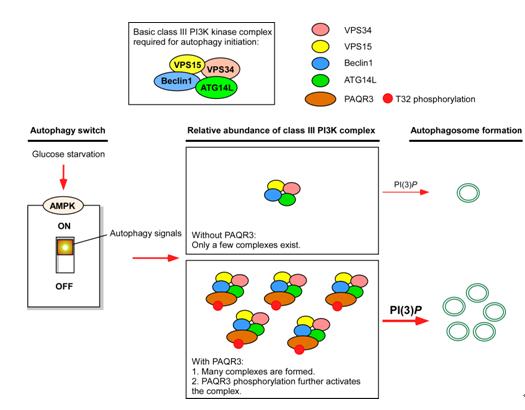
Autophagy is an evolutionarily conserved intracellular degradation process. Dysregulation of autophagy is implicated in numerous diseases, such as neurodegeneration and cancer. As a central node of autophagy, class III PI3K plays different roles in autophagy progress by interacting with diverse molecules, such as ATG14L and UVRAG. However, the detailed molecular mechanism that orchestrates the sequential activation of different class III PI3K complexes remains unknown.
Recently, a research group led by Dr. CHEN Yan from the Institute for Nutritional Sciences, Shanghai Institutes for Biological Sciences, Chinese Academy of Sciences found that a Golgi-resident seven-transmembrane protein PAQR3, a member of the progestin and adipoQ receptors (PAQR) superfamily, modulates class III PI3K and autophagy initiation at two levels.
PAQR3 serves as a scaffold protein to promote the formation of ATG14L-linked VPS34 complex, leading to increased PI(3)P generation capacity before starvation signal comes. After receiving glucose starvation signal, AMPK phosphorylates PAQR3 at threonine 32 in an ATG14L-dependent manner, resulting in powerful PI(3)P production and swift autophagosome formation. Besides, in PAQR3 knockout mice, PAQR3 deletion leads to decreased exercise-induced autophagy and behavioral disorder, such as impaired stability on the accelerating rotarod, abnormal limb clasping, ataxic walking pattern and weakened grip strength.
In summary, PAQR3 not only enhances the capacity of pro-autophagy class III PI3K by its scaffold function, but also integrates activated AMPK signal to ATG14L-linked VPS34 complex in response to glucose starvation.
This work was published online in the EMBO JOURNAL on February 1, 2016, as a research article entitled “PAQR3 controls autophagy by integrating AMPK signaling to enhance ATG14L-associated PI3K activity”.
This study was funded by research grants from National Natural Science Foundation of China, Ministry of Science and Technology of China, and China Postdoctoral Science Foundation.

A schematic model of PAQR3 regulation on autophagy in response to glucose starvation (Image by Dr. CHEN Yan’s lab)

86-10-68597521 (day)
86-10-68597289 (night)

52 Sanlihe Rd., Xicheng District,
Beijing, China (100864)

